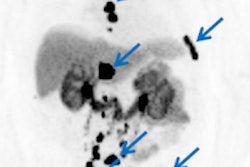A protein linked to polyethylene glycol (PEG) chains can attach itself to ovarian and prostate cells and could be used for imaging and personalized cancer treatment, according to a study presented this week at the 2015 Society of Nuclear Medicine and Molecular Imaging (SNMMI) meeting.
The agent consists of PEG-AVP0458, a small pegylated protein, labeled with the radionuclide iodine-124 (I-124). Drugs of this type are known as theranostic agents because they can be used for both imaging and personalized cancer treatment, researchers from Austin Hospital in Melbourne, Australia, said in a statement accompanying the SNMMI presentation.
Stronger radionuclides or even toxins can also be attached to the protein, known as an avibody, to destroy tumors while protecting nearby healthy tissues, the study team wrote.
In the study, five men with prostate cancer and one woman with ovarian cancer were imaged safely with variable doses of I-124 PEG-AVP0458. PET images highlighted areas of increased agent binding in metastatic tumors of the liver and lymph nodes within a day of injection.
Investigators working with the manufacturer of the agent, Avipep, said they expect clinical trials to continue over the next three to five years.




















